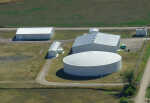Five years out, McCook's water treatment plant is doing its job

McCOOK, Nebraska -- McCook has gone to great lengths and considerable expense to provide the quality of tap water that citizens receive today.
The fight for quality drinking water in McCook dates all the way back to 1988, when chemical tests of the city's water supply detected a high level of nitrates.
Although the moment during an April 2011 City Council meeting may have gone uncelebrated, the words of McCook Utilities Director Jesse Dutcher may very well have marked the end of a long journey that began 23 years ago. After presenting council members with a recap of the water treatment plant's first five years of operation, Dutcher stated simply, "The bottom line is that it works."
Two weeks following Dutcher's words, City Council members proclaimed May 1-7, 2011, as "Drinking Water Week."
For those who have been here and taken part in the journey, it should have been a enjoyable moment, but for those who migrated here more recently, or simply didn't follow the story as it unfolded, a timeline detailing McCook's water history from 1988 to 2005, can be found at http://www.mccookgazette.com/story/1090353.html
Dutcher's five-year recap for councillors cited allowable limits of three contaminants -- nitrates, arsenic and uranium -- in McCook's drinking water. He later explained to the Gazette that all three occur naturally in the environment. "In a nutshell each of the contaminates are considered non-point source contaminates, which means that no specific source has been determined," said Dutcher, who provided further details on each one.
"Nitrate and nitrite are naturally occurring inorganic ions that are part of the nitrogen cycle," said Dutcher, adding that as organic material such as vegetation and animal waste is decomposed in soil, nitrate is produced. Dutcher also said that in agricultural areas, nitrogen-based fertilizers are also a source of nitrate contamination. McCook tap water contains 3 parts per million, well below the federal limit of 10 parts per million.
Arsenic, which according to the United States Environmental Protection Agency, occurs naturally in rocks and soil, water, air, plants and animals, can be further released in the environment through natural activities such as erosion of rocks, forest fires, volcanic action or through human actions. It is found in some wood preservatives, paints, dyes, metals, drugs, soap and certain fertilizers, with western states more likely to have high levels. Of the 54,000 community water systems in the United States, the EPA reports that approximately five percent currently do or will need to take corrective action to lower arsenic levels to below .010 parts per million, McCooks level is .006 parts per million.
"Uranium in drinking water almost always comes from natural sources in the earth," according to Dutcher. It is the result of the eroding of rock containing uranium and in 2000 the Safe Drinking Water Act was amended to set the maximum contaminate level at 30 parts per billion, McCook's level is 16 parts per billion.
While many consumers have taken to the solace of bottled water in the last decade, they may be surprised to know what they are drinking. Critics and supporters both have made many claims to the quality of bottled water. Most people have heard the arguments that range from bottled water being contaminant free, to not meeting California drinking water standards. The reality, as is usually the case, lies somewhere in the middle.
According to Dutcher, bottled water is governed by the Food and Drug Administration and their requirements are the same as those allowed in drinking water from the tap.
"And I like to point out that tap water costs way less," said Dutcher, who added that bottled water is usually around a $1 per 20 ounce bottle, with tap water a mere $1.63 for 750 gallons.
